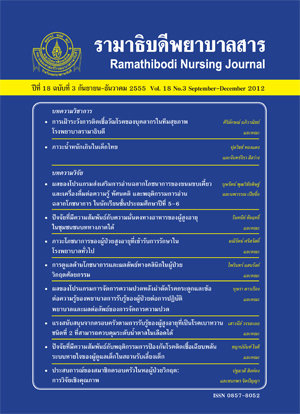แรงสนับสนุนจากครอบครัวตามการรับรู้ของผู้สูงอายุที่เป็นโรคเบาหวาน ชนิดที่ 2 ที่สามารถควบคุมระดับนํ้าตาลในเลือดได้
Main Article Content
Abstract
บทคัดย่อ
การศึกษาครั้งนี้เป็นการวิจัยเชิงคุณภาพ เพื่อศึกษาแรงสนับสนุนจากครอบครัวตามการรับรู้ของผู้สูงอายุที่เป็นโรคเบาหวานชนิดที่ 2 ที่สามารถควบคุมระดับนํ้าตาลในเลือดได้ โดยคัด เลือกกลุ่มตัวอย่างตามเกณฑ์ที่กำหนดจากผู้สูงอายุที่เป็นโรคเบาหวานชนิดที่ 2 ที่มารับบริการ ตรวจจากคลินิกผู้ป่วยเบาหวาน แผนกผู้ป่วยนอก โรงพยาบาลดำเนินสะดวก จังหวัดราชบุรีระหว่าง เดือนกรกฎาคมถึงตุลาคม พ.ศ. 2552 จำนวน 22 ราย เครื่องมือที่ใช้ในการเก็บข้อมูลประกอบด้วย แบบบันทึกข้อมูลส่วนบุคคล แบบบันทึกข้อมูลเกี่ยวกับสุขภาพทางคลินิก และแบบสัมภาษณ์เชิงลึกที่ผู้วิจัยสร้างขึ้น วิเคราะห์ข้อมูลโดยใช้สถิติบรรยายและการวิเคราะห์เนื้อหา ผลการวิจัยพบ ว่ามี 3 ประเด็นหลัก คือ 1) แรงสนับสนุนจากครอบครัว 2) การดูแลตนเอง และ 3) การแลกเปลี่ยนพึ่งพาซึ่งกันและกัน ในประเด็นหลักที่ 1 แรงสนับสนุนจากครอบครัว ประกอบด้วยแหล่ง สนับสนุนจากครอบครัว บทบาทของครอบครัวในการสนับสนุน แบบแผนของแรงสนับสนุน จากครอบครัว และผลของแรงสนับสนุนจากครอบครัว ประเด็นหลักที่ 2 การดูแลตนเอง ประกอบด้วยผู้สูงอายุปรับวิธีคิดในการยอมรับความเจ็บป่วย แสวงหาความรู้เกี่ยวกับโรคเบาหวาน และปรับเปลี่ยนพฤติกรรมในการควบคุมระดับน้ำตาลในเลือด และประเด็นหลักที่ 3 การแลกเปลี่ยนพึ่งพาซึ่งกันและกัน โดยแรงสนับสนุนจากครอบครัวและการดูแลตนเองมีปฏิสัมพันธ์กันอย่างเป็นพลวัตร ในการควบคุมโรคเบาหวาน ผลการวิจัยครั้งนี้จะช่วยให้บุคลากรทีมสุขภาพเข้าใจแรงสนับสนุนจากครอบครัว เพื่อพัฒนารูปแบบการให้บริการที่สอดคล้องกับความต้องการและความสามารถของผู้สูงอายุและครอบครัวในการควบคุมระดับนํ้าตาลในเลือด และเพิ่มคุณภาพชีวิตให้แก่ผู้สูงอายุที่เป็นเบาหวานชนิดที่ 2 ต่อไป
คำสำคัญ: แรงสนับสนุนจากครอบครัว การดูแลตนเอง การควบคุมระดับนํ้าตาลในเลือด ผู้สูงอายุ โรคเบาหวานชนิดที่ 2
Abstract
The purpose of this qualitative study was to explore family support perceived by older persons with controlled type 2 diabetes. Purposive sampling was used to recruit a sample of 22 older persons with controlled type 2 diabetes who sought treatment at the diabetes clinic outpatient department at Damnoensaduak Hospital, Ratchaburi Province during July to October, 2009. The instruments used in the study included the Demographic Data Form, the Clinical Data Record Form, and the Interview Guide developed by the researchers. The data were analyzed using descriptive statistics and content analysis. The analysis revealed three main themes: perception of family support in controlling diabetes, self-care, and reciprocal interaction between family support and self-care. The first theme consisted of perception of family support involving sources of family support, roles of family in the support, patterns of family support, and perceived effects of family support. The second theme consisted of self-care for diabetes control involving adjusting perception toward diabetes to accept it, seeking information about diabetes, and learning about diabetes control. The final theme was the reciprocal interaction between family support and self-care to control diabetes. In conclusion, results in this study can elucidate the healthcare personnel to understand how family support contributes to diabetes control in older Thai persons. This information could help healthcare personnel develop services relevant to needs and abilities of older persons and their families for diabetes control. This would possibly increase the quality of life in older persons with type 2 diabetes.
Keywords: Family support, Self-care, Diabetes control, Older persons, Type 2 diabetes
Article Details
บทความ ข้อมูล เนื้อหา รูปภาพ ฯลฯ ที่ได้รับการตีพิมพ์ในรามาธิบดีพยาบาลสาร ถือเป็นลิขสิทธิ์ของวารสาร หากบุคคลหรือหน่วยงานใดต้องการนำทั้งหมดหรือส่วนหนึ่งส่วนใดไปเผยแพร่หรือเพื่อกระทำการใด ใด จะต้องได้รับอนุญาตเป็นลายลักษณ์อักษรจากรามาธิบดีพยาบาลสารก่อนเท่านั้น


